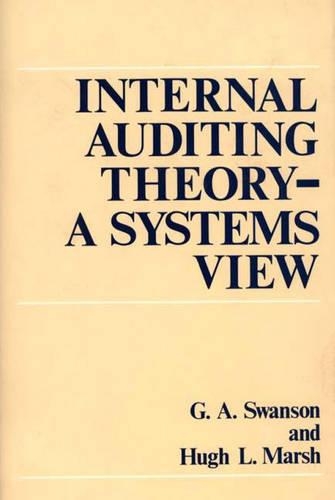
Internal Auditing Theory--A Systems View
(Hardback)
Publishing Details
Internal Auditing Theory--A Systems View
By (Author) Hugh Marsh
By (author) G A Swanson
Bloomsbury Publishing PLC
Praeger Publishers Inc
9th May 1991
United States
Classifications
Tertiary Education
Non Fiction
657.458
Physical Properties
Hardback
232
Description
In this work, G.A. Swanson and Hugh Marsh present an interpretive and analytical study of the function of internal auditing, not only from the viewpoint of its role in an organization, but also in regard to the role it plays in the economics of societies and governments. They create a theory of internal auditing and place it within the context of a scientific conceptual framework called Living Systems Theory. Using this approach, they are able to provide a basis for developing a systematic theoretical framework of internal auditing, as well as a theory based on observable, measurable entities. The book begins with a survey of the auditing profession and an introduction to the basic principles of the Living Systems Theory. From this base, Swanson and Marsh discuss a series of specific issues and areas of concern in internal auditing, including its functions, profession, and history, and its professional standards. Subsequent chapters address such topics as money-information, non-monetary quantitative information, estimating compound measurement and forecasting error, non-quantitative assessments, concrete process analysis and living systems process analysis, and ethics. Throughout the book, Swanson and Marsh identify the advantages of using the living systems theory to advance the knowledge and understanding of organizations, and also propose a higher level of internal audit functions that can advance modern societies. This work will be an important tool for members of the accounting and auditing professions, for students of business and accounting practices, and for professionals in other business and finance positions.
Reviews
The authors state the purpose of this book "is to develop a conceptual framework of internal auditing in terms of concrete measurable systems." Insisting that all auditing is internal auditing, they describe the audit function as a subsystem of human systems and make extensive use of "living systems theory" as expounded by James G. Miller (Living Systems). There is some rivalry between independent public accountants (CPAs) and internal auditors who are employees of companies and other organizations. The rivalry mainly involves issues of relative status as a "profession" and the role of independence. Swanson and Marsh do not hide the fact that they side with internal auditors. In 11 chapters they apply a systems view to many aspects of audits, including defining internal auditing, professional standards, types of information, measurement error, and ethics. Many potentially valuable insights are developed in this analysis. The authors do not claim to provide a comprehensive auditing theory; rather they explore one way of looking at auditing, its role in the economy, and the desirability of different forms of regulation. Useful in programs that include graduate work in accounting.-Choice
"The authors state the purpose of this book "is to develop a conceptual framework of internal auditing in terms of concrete measurable systems." Insisting that all auditing is internal auditing, they describe the audit function as a subsystem of human systems and make extensive use of "living systems theory" as expounded by James G. Miller (Living Systems). There is some rivalry between independent public accountants (CPAs) and internal auditors who are employees of companies and other organizations. The rivalry mainly involves issues of relative status as a "profession" and the role of independence. Swanson and Marsh do not hide the fact that they side with internal auditors. In 11 chapters they apply a systems view to many aspects of audits, including defining internal auditing, professional standards, types of information, measurement error, and ethics. Many potentially valuable insights are developed in this analysis. The authors do not claim to provide a comprehensive auditing theory; rather they explore one way of looking at auditing, its role in the economy, and the desirability of different forms of regulation. Useful in programs that include graduate work in accounting."-Choice
Author Bio
G. A. SWANSON is Professor of Accounting and Chairperson of the Department of Accounting at Tennessee Technological University. / His more than 50 articles have appeared in such journals as Internal Auditor, The Accounting Review, the Journal of Accountancy, Behavioral Science, and Systems Research. HUGH L. MARSH, retired director of Internal Audit for ALCOA, is a former chairman of the board of The Institute of Internal Auditors and a life member of the Financial Executives Institute. He is also an Emeritus Life Associate of the National Association of Accountants, a Certified Management Accountant, and a Certified Internal Auditor. He was a member of the Treadway Commission and is currently a management consultant.
